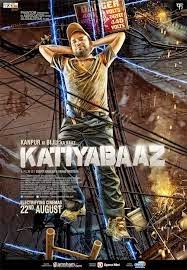 |
| Buno Haansh |
Cast:
Dev, Srabanti, Tanusree Chakraborty, Sohag Sen,
Sudiptaa Chakraborty, Moon Moon Sen
Direction:
Aniruddha Roy Chowdhury
Need, greed, exploits, chase — and an uncertain
return! Aniruddha Roy Chowdhury, known for his urban tales of love and longing,
takes a turn — almost 360° — to plunge into the dark dungeons of Kolkata and
discovers gold in filth and grease. His movie, replete with crime movie cliches
— good boy meets bad boy, poverty playing havoc, the inviting whirlpool of
danger from where there's no respite — turns every stock situation and
character into an advantage as he etches out real people and shows flourishes
of style that make you gape in awe. Well, nothing can go wrong if your heart is
at the right place.
That's for the maker. It does go wrong at the onset
for Amal, the clean slate of a guy who makes both ends meet working as a guard
at a mall. Poverty leads to that chronic malaise, unhappiness, and he takes up
the job of a carrier when offered one. Thus, begins life on the wild side. BunoHaansh isn't about ruthlessness, grandiosity, pipe
dreams. It's not even a whodunnit. For that matter, the film is a study in
contrasts: the tale of life on a road treaded more but explored less, at least
cinematically, in Bengal. As Harendra Singh's camera
crosses borders, zooms in and out of the innocuous daytime markets in Mumbai,
Bangkok, Dhaka and the fiendish lanes and bylanes of nocturnal Kolkata and
beyond, you come face to face with reality, no matter how stark, no matter how
evil. As Amal wanders down dangerous roads, he paints a picture of the city's
underbelly and its many inhabitants. There's the westernized Madam in
ethnicwear, bad boy Robin, diabolical Adrija, consignment coordinators,
assignment givers... As one event leads to another, Amal comes across Rijula
and life takes yet another turn. Then on, its run, run more, and run some
more...
All the characters in the movie, however, are not
bred by Samares Mazumdar's eponymous novel. Aniruddha has taken many creative
liberties, some of which work wonders. The most precious churnout is Amal's
sister-in-law, who is not nagging as in the novel and becomes the protagonist's
biggest support system. Pushed to the brink by poverty, she renders one
speechless when owning up about having to pop pills while yearning to become a
mother. With her pechhonebaansh, bogoleitihaash line, she is symbolic of the
millions living on the fringes of this society, ostracized by its greatest
evil, poverty. She lends Amal character — her pain, anguish, concern a possible
justification for his behaviour. Sudiptaa Chakraborty, in a power packed
performance, is bound to stun and silence actresses her age, older and younger.
So what if she has competition in Sohag Sen as Amal's mother, Srabanti (Sohag)
as Amal's love interest, and TanusreeChakraborty (Rijula) as Amal's partner in
crime? Sohag is motherly, Tanusree shows promise despite being less mysterious
than in the novel, and Srabanti — though she looks straight out of GoynarBaksho in many scenes — is effective
in her small role.
As women pack a punch, Aniruddha can pat himself
some more. All his actors — operators of the international crime syndicate —
shine in character roles, be it Gargi Roychowdhury, Shankar Chakraborty,
Arindam Sil, Anindya Banerjee, Shantilal Mukherjee, though Moon Moon Sen aka
Madam is very... Moon Moon Sen. Did we see Raima Sen turning on the heat in one
sequence, dance-happy and dialogueless ? BunoHaansh, which is as much about its
characters as about the story, passes a litmus test as Dev aka Amal turns in a
mature performance. No wildlife safari, this is life, wild, very wild. And Dev,
despite some diction irregularities here and there and falling a tad short when
pitted against Sohag or Sudiptaa, pulls off the role of a simpleton who has his
innocence intact as he meets the vagaries of life, chin-up. In a poignant
moment, he sits on the banks of Padma, remembers his parents' agony of living
life away from their motherland and smears the soil across his forehead. Tears
come naturally to him, but they don't break his character, they make him. He is
both vulnerable and strong, dancing to the tunes of Rijula in one half of the
movie and wielding the gun in an ambush on the overbridge. Does he succeed?
Telling it would be telling the story. But what can be said is that Aniruddha
doesn't rob himself of his signature style. So, there's hope and hopelessness,
end and a possible beginning.
Another positive of the movie is its music. The
Aniruddha-ShantanuMoitra-Anindya-Chandril combination has done magic before and
it doesn't come as a surprise that they cast a spell again, joined in by
Srijato in the efforts. The song, Zindagikahinbhithamtinahin, in fact, aptly sums up the
theme of the movie. That apart, there's music that entertains, prods and
provokes... What also stands out is the director's eye for detail. So, when a
flight takes off, you can see its shadow fleetingly kissing the grass below,
when a phone is found from the scene of crime, there's a droplet of blood on
its display. Strange then, why should Sohag, who is undergoing treatment, have
hair on her head after her pate's shown wrapped in a towel in a previous scene?
This review is not to find faults, this is not even to praise. Let the box
office do the talking. The wild goose chase on the bumpy road of life is indeed
engrossing. Fact is, there's a road ahead and this film is a journey. For the
fainthearted, whose roads bend south at every turn, there's just one pointer —
DANGER AHEAD.
























